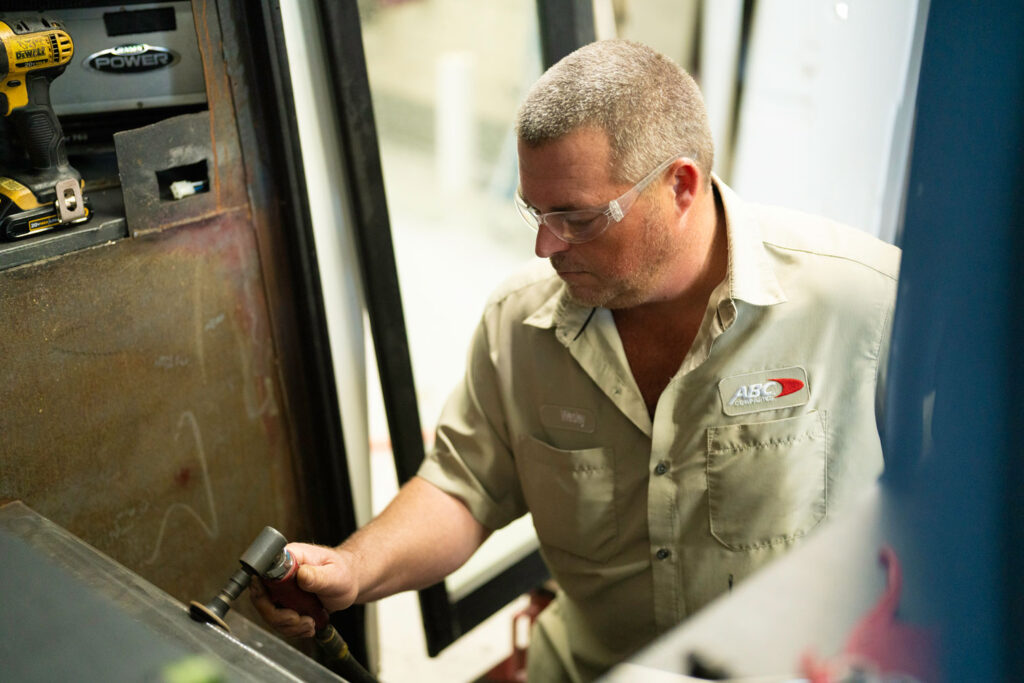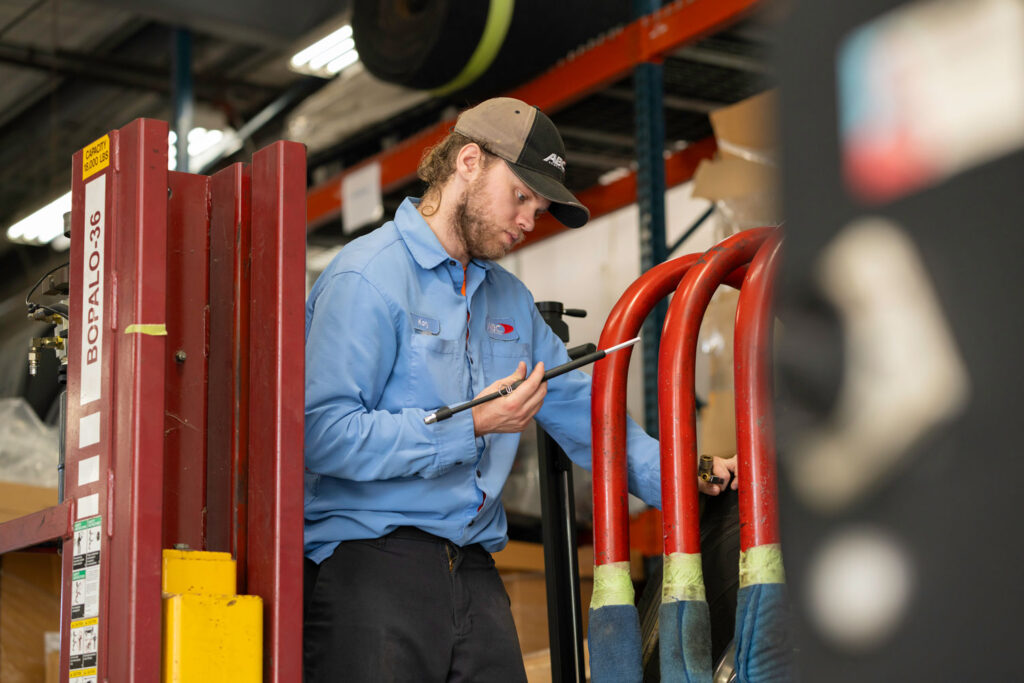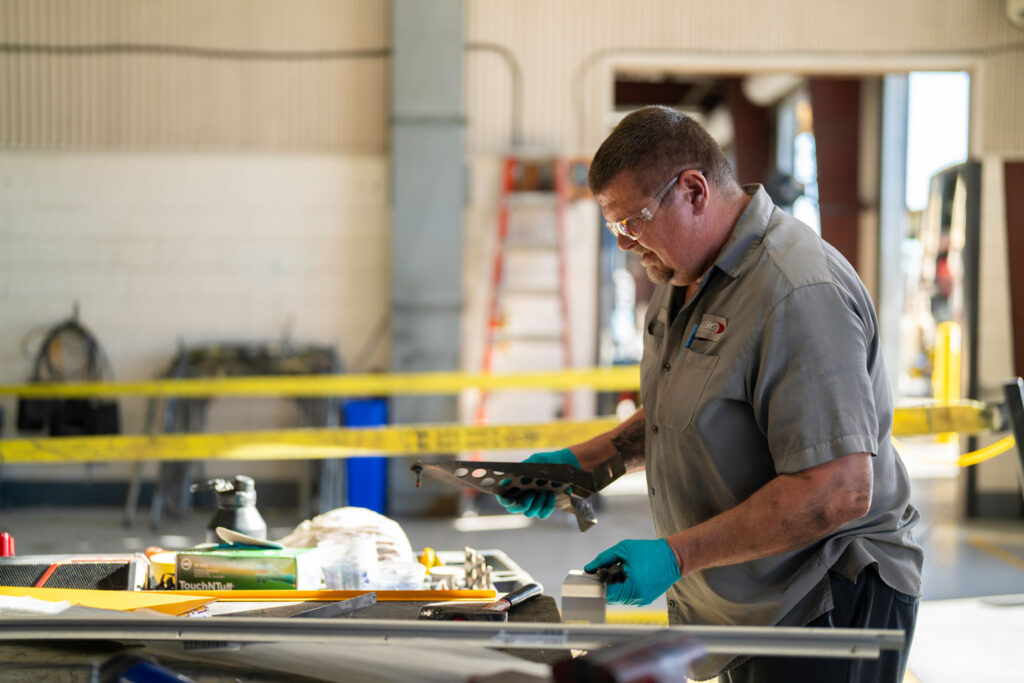5 Essential Skills Every Fleet Technician Needs Today
- August 5, 2025
- Blog
- Posted by Kiran Kaur
- Comments Off on 5 Essential Skills Every Fleet Technician Needs Today

What’s Driving the Shift in Fleet Technician Skillsets
Fleet operations are facing a turning point. Vehicles are becoming more complex, data-driven, and environmentally advanced. Yet as fleets race ahead, technician skillsets and capabilities are struggling to keep pace.
Operators report that 77% of rising costs are their top concern, with driver shortages, increased regulation, and maintenance complexity ranking high among persistent challenges. Meanwhile, experienced technicians are retiring faster than replacements can be trained. A recent report estimates a shortage of nearly 613,000 technicians by 2024, with updated projections now reaching nearly 971,000 between 2024 and 2028.
At the same time, fleets using telematics and data tools are seeing measurable benefits. According to a recent industry trends report, GPS fleet tracking delivers an average of 16% savings on fuel, maintenance, and labor costs.
As fleets evolve, technicians must evolve with them. Training technicians to work with emerging technologies, data platforms, and advanced systems is essential for staying compliant, reducing costs, and maintaining operational performance.
Here are the five essential skills every fleet technician should be developing right now to remain competitive and resilient.
Skill 1. Diagnostic and Troubleshooting Expertise
Data, computers, and the Internet of Things have transformed modern vehicles into information-rich systems. Technicians must now be skilled at using diagnostic scanners, telematics platforms, OEM software, and onboard systems such as multiplexing dashboards and integrated vehicle health reports. However, interpreting a faulty code is only the starting point. The skill lies in uncovering root causes by comparing real-time alerts against performance trends and thresholds.
Fleets that adopt proactive diagnostics report significant operational improvements. These include fewer unplanned repairs, smoother compliance, and a lower cost per mile. A recent analysis shows that predictive maintenance powered by telematics can significantly reduce downtime and repair costs by identifying issues early.
Success in diagnostics requires more than just tools. Technicians need to think like investigators. They must triage alerts, validate sensor data, and perform targeted tests to confirm diagnoses. Training with scenario-based drills such as simulated fault codes or telematics alerts helps build consistency and accuracy.
Technicians who resolve complex issues on the first visit contribute directly to improved uptime, reduced operating costs, and better overall fleet performance.



Skill 2. Mechanical and Electrical System Proficiency
While diagnostic tools and platform dashboards are becoming standard, mechanical and electrical system expertise remains the foundation of effective fleet maintenance. Vehicles continue to rely on systems such as HVAC, exhaust after treatment, braking, vehicle control wiring, and in some cases, high-voltage components.
Technicians must confidently serve both traditional systems, like emission filters and fuel injectors, and electrical systems like lighting and control modules. Training should combine hands-on work with OEM troubleshooting guides and system schematics. Following a structured diagnostic sequence helps prevent excessive downtime and improves first-time fix rates.
According to a recent industry feature, continuous technician training leads to fewer errors in the shop and smoother tie-ins with software-driven maintenance systems.
By investing in comprehensive mechanical and electrical training, fleets can build stronger in-house capabilities, improve uptime, and reduce reliance on external service providers.
Skill 3. Digital Literacy and Diagnostic Software Skills
Digital proficiency is now essential for fleet technicians. Despite 68% of fleets using maintenance platforms, more than half struggle with multiple systems, creating redundant processes and data silos. This often leads to delays and missed insights.
Technicians need to be skilled in:
- Performing firmware updates and system calibrations
- Completing work orders through OEM portals or mobile platforms
- Accessing parts catalogs and vehicle service histories
Tablet workflows, live diagnostic features, and integrated chat support are becoming standard in modern fleet operations. Practical training such as guided firmware updates and digital repair logging builds technician confidence and helps reduce mistakes.
According to a recent feature, shops using digital maintenance systems report fewer billing oversights and improved revenue capture because technicians are less likely to miss time or parts charges when data is collected digitally and automatically.
Skill 4. Communication and Customer Service for Fleet Technicians
A common breakdown is rooted not under the hood, but in communication between driver, dispatcher, technician, and office staff. Strong internal communication contributes to faster service turnarounds, fewer misdiagnoses, and better fleet performance overall. A recent article highlights shops with strong communication protocols experience fewer repeat visits and faster approvals for service requests.
Structured training exercises such as role-playing repair handoffs or practicing service debriefs, help technicians build confidence in adapting their communication to different team members. Templates for updating status reports or summarizing repair actions also help standardize clarity and reduce back-and-forth.
When technicians communicate clearly and consistently, fleets benefit from stronger internal alignment, better service documentation, and fewer delays due to misunderstanding.

Skill 5. Adaptability and Ongoing Training in Fleet Maintenance
Fleet technology evolves rapidly. With the rise of electric powertrains, updated emissions standards, expanded telematics tools, and ongoing changes in safety and regulatory protocols, technicians must remain agile to stay ahead of what’s next.
Technicians are now expected to manage regular firmware updates, recalibrate sensors, and understand manufacturer-specific updates across powertrains, HVAC, and aftertreatment systems. Providing access to online courses and microlearning modules enables technicians to develop skills in brief, focused sessions without disrupting operations. Certifications in electric drivetrains, diagnostic platforms, or ADAS calibration help ensure that technicians are prepared for the latest vehicle requirements.
Ongoing training is more than a technical advantage; it also drives measurable performance. A recent report found that fleets with structured technician training and scheduled service programs experienced reduced safety incidents, higher compliance scores, and more reliable service performance.
By investing in regular upskilling, fleets build a stronger workforce, increase vehicle uptime, and maintain readiness as fleet standards continue to evolve.
How Fleet Leaders Can Develop These 5 Essential Technician Skills
For fleet operators and maintenance managers, the challenge isn’t whether change is coming. The question is whether your team is prepared to meet it. Here are five strategies to build a more capable, future-ready technician workforce:
- Conduct a skills audit
Evaluate current strengths and identify gaps in diagnostics, mechanical systems, digital tools, communication, and adaptability. Use shop-level observations and feedback from senior technicians to map where training is most needed.
- Design targeted training programs
Create structured learning paths that combine hands-on labs, firmware update demonstrations, and communication workshops. Training should align with actual job roles and shop conditions.
- Equip technicians with digital tools
Provide tablets, diagnostic software, and access to online technical libraries. Introduce guided practice using real fleet vehicles to improve comfort with digital platforms and troubleshooting protocols.
- Measure training effectiveness
Track key metrics such as first-time fix rates, repeat repair frequency, shop downtime, and compliance performance. These indicators help you adjust training and identify high performers.
- Recognize and reward growth
Celebrate certifications and on-the-job application of new skills. Public recognition and small incentives help reinforce a culture of learning and continuous improvement.
The transportation industry is evolving rapidly, and technicians remain essential to fleet success. What has shifted is the scope of their responsibilities. Today’s technicians are not just wrench-turners. They are system thinkers, digital communicators, and frontline safety contributors.
Technicians who can navigate data platforms, maintain electrified systems, recalibrate onboard safety sensors, and communicate clearly across departments are already driving better outcomes. As fleets grow more complex, these skills will only become more critical.
Fleets that invest in technician development now will be better equipped to handle tomorrow’s operational challenges. The future of fleet maintenance is already taking shape. The next step is ensuring your team is ready for it.
Where to Start with Technician Training and Upskilling
Building technician readiness starts with giving your team the right tools to learn and grow. ABC University offers a free Learning Management System designed specifically for operators, technicians, and fleet support staff.
The platform includes courses across key areas such as diagnostics, mechanical systems, digital service tools, communication techniques, and emerging vehicle technologies. Each course is self-paced and mobile-friendly, making it easy for technicians to train without interrupting daily operations.
Managers can assign courses, track progress, and verify completion using built-in administrative tools. With more than 16 courses and hundreds of learning modules available, the program provides a flexible framework for team-wide upskilling.
Certificates of completion are awarded for every course, helping teams document their growth and meet internal training standards. This approach supports ongoing development while improving shop efficiency, safety, and technician confidence.
Get Your Team Future-Ready
Explore training tools that help your technicians stay sharp and your fleet running strong.
🔗 Start with ABC University

